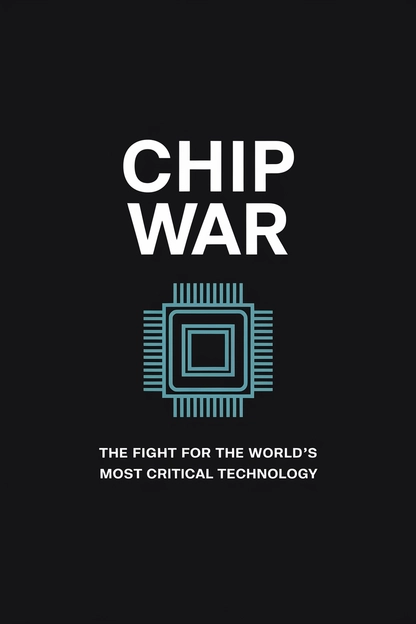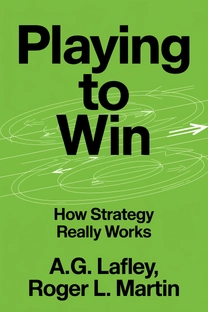
Chip War
The Fight for the World's Most Critical Technology
by Chris Miller
Brief overview
This book chronicles how microchips became the most critical drivers of our modern economy, transforming everything from warfare to household gadgets. It takes you on a journey through the relentless pursuit of smaller, faster, and cheaper semiconductors, revealing how corporate competition, government strategy, and global trade tensions have shaped our tech-driven world.
Introduction
Semiconductors might seem like tiny, unremarkable components, but they power virtually everything in our digital world. From mobile phones to missiles, these chips are both an economic engine and a strategic asset. Over the decades, corporations and nations have competed fiercely for leadership in this industry, spurring breakthrough innovations and shifting power balances.
It’s fascinating to see how a handful of brilliant minds turned the humble transistor into the building block for modern computing. Yet the stakes grew beyond mere technology. Nations realized that controlling chip production could yield economic clout and military advantages. That realization launched a global scramble—one that continues to shape our tech landscape today.
In this introduction, you’ll get a taste of how something so small can have such a massive impact. This is the stage on which competing visions of national policy, corporate strategy, and cutting-edge engineering meet. By the end of this book, you’ll appreciate just how crucial semiconductors have become to living in the twenty-first century.
The Evolution of Semiconductors
The story begins with the invention of the transistor in the mid-twentieth century. Researchers at major labs discovered how a tiny transistor could replace bulky vacuum tubes. Although it started as an esoteric invention, its potential to make electronics cheaper, smaller, and more reliable was monumental.
Early pioneers then combined multiple transistors onto a single piece of silicon, creating the first integrated circuits. This step cut the cost and complexity of electronics drastically. Companies like Fairchild Semiconductor and newly formed Intel led the charge in mass production, enabling NASA’s Apollo missions and laying the groundwork for consumer electronics.
Soon, experts observed that transistor counts could double every couple of years—an observation famously known as Moore’s Law. This exponential leap in processing power revolutionized computing, bringing us from room-sized machines to pocket devices in a few short decades.
What is Chip War about?
“Chip War: The Fight for the World's Most Critical Technology” traces the strategic importance of semiconductors and how global relationships hinge on these tiny powerhouses. Chris Miller examines crucial innovations, such as shrinking transistor sizes and refining production methods, to show what it takes for nations and corporations to stay ahead. In unraveling the complex layers of design, fabrication, and distribution, the book reveals why controlling microchip supply chains can tip the global balance of technology.
Readers gain a clear view of the stakes involved: from securing military advantages to keeping consumer economies thriving. “Chip War” underscores how every step in this industry—not just the end product—has enormous geopolitical impact. By highlighting the history, competitive landscape, and delicate alliances, the book shows that semiconductors are not just another gadget component but a vital thread in the fabric of international power.
Review of Chip War
This work excels in illustrating the vital role microchips play in our connected world. One standout feature is how Chris Miller takes intricate concepts like photolithography and geopolitical power shifts, then translates them into engaging, plain-language explanations. Depth of research meets accessible storytelling, giving readers practical insights on why chip manufacturing aligns so closely with national security goals.
Beyond technical details, the book offers real-world lessons. It reviews how supply chains, cost-cutting strategies, and government policies helped shape today’s competitive environment. The writing flows smoothly, making it suitable for diverse audiences—whether you’re a global affairs enthusiast or a technology professional. Each chapter draws clear connections between semiconductor breakthroughs and daily life, anchoring the text in everyday relevance.
Ultimately, “Chip War” is a thorough and approachable guide that reveals why semiconductors stand at the center of modern industry and diplomacy. It’s a highly recommended read for anyone seeking to understand the forces shaping tomorrow’s technology and economy.
Who should read Chip War?
- Policy analysts wanting to grasp the strategic significance of chip supply chains
- Business leaders and investors exploring shifts in tech manufacturing
- Engineers and developers curious about the real-world impact of their innovations
- Academics and students studying global trade or geopolitical issues
- Technology enthusiasts eager to learn how everyday devices connect to global power
About the author
Book summaries like Chip War
Why readers love Mindleap
10-Minute Book Insights
Get the core ideas from the world's best books in just 10 minutes of reading or listening.
Curated For You
Discover your next favorite book with personalized recommendations based on your interests.
AI Book ExpertNew
Chat with our AI to help find the best book for you and your goals.
Reviews of MindLeap
Love how I can get the key ideas from books in just 15 minutes! Perfect for my busy schedule and helps me decide which books to read in full.
Alex R.
The summaries are incredibly well-written and the audio feature is perfect for my commute. Such a time-saver!
Jessica M.
Great app for personal growth. The insights are clear and actionable, and I love how they capture the essence of each book.
Chris P.
The app is beautifully designed and the summaries are top-notch. Definitely worth every penny!
Sarah K.


